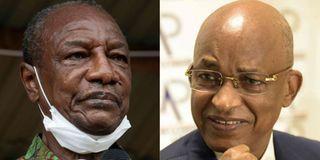Concerns in Sierra Leone as neighbouring Guinea heads for polls

Guinea President Alpha Conde (left) and main opponent of Cellou Dalein Diallo.
As Guinea braces for a presidential election this weekend, concerns are mounting across the border in Sierra Leone amid allegations of meddling.
Guinea’s President Alpha Conde last week accused Sierra Leone’s Vice President of supporting his main opponent, veteran opposition leader Cellou Dallein Diallo.
And the apparent failure of Sierra Leonean authorities to take the issue seriously has raised further concerns.
Mr Conde, 82, is seeking a third term after controversially altering the country’s constitution that initially allowed for only two five-year terms.
The Rally of the Guinean People (RPG) candidate faces 12 other contenders, including Mr Diallo, who is running under the ticket of the Union of Democratic Forces of Guinea (UFDG).
Mr Conde first came to power in 2010 in an election that ended nearly three years of military rule. The coup was staged following the sudden death of long time President Lansana Conte in office. In 2015 Mr Conde was again re-elected.
The opposition disputed both elections.
Marred by violence
The run-up to this Sunday, October 18 election has been marred by violence, with fears of more violence during and after the vote.
These concerns were heightened in Sierra Leone by allegations by Mr Conde that Sierra Leone is playing host to a group of Guinean mercenaries on training to wage violence in his country.
Mr Conde named Sierra Leone’s Vice President, Dr Mohamed Juldeh Jalloh, of facilitating the training, which he alleged was ongoing in the Sierra Leonean district of Kambia, home to the main border region linking the two countries.
Since the allegation was made, both governments have been tight-lipped on the issue.
However, an opposition lawmaker in Sierra Leone on Monday warned that the silence from his country could be dangerous.
“The claim apportioned on Sierra Leone is grave and can be injurious, looking at the sisterly ties between the two countries in terms of free movement of people, free trade, and a lot more,” Mr Mohamed Bangura, member of Parliament for the main opposition All Peoples Congress (APC), wrote in an open letter directed to President Julius Maada Bio.
Mr Bangura called on the Bio administration to mount an “urgent” investigation into the issue.
When the allegations were first made, media reports indicated fears in the Sierra Leonean community living in Guinea, amid talk of reprisals.
But the concerns, according to Mr Bangura, go beyond that. He said any unrest in Guinea had the potential of spilling over to Sierra Leone, citing the country’s 11 years [1991-2002] civil war, which started in Liberia and the 2014-2016 West African Ebola epidemic which started in Guinea.
“Many of Sierra Leone’s worst horrors have been imported from overseas, particularly our immediate neighbours; the brutal civil war, the ravenous Ebola virus disease outbreak, to name a few. This is a simple indication that when our neighbors sneeze, Sierra Leone catches cold,” noted the opposition lawmaker.
Like in most of Africa, elections in Guinea take ethnic lines. While President Conde appears to get most of his support from the Mandingo ethnic group, his main opponent, Mr Diallo, draws most of his support from the Fulani ethnic group. The Fulani are predominantly into business, which means they are scattered across the sub region.
There is a substantial number of them in Freetown, Sierra Leone.
Last year, an attack on the Guinean embassy in Freetown was linked to them. At least one person died in that attack, which is still under police investigation.





